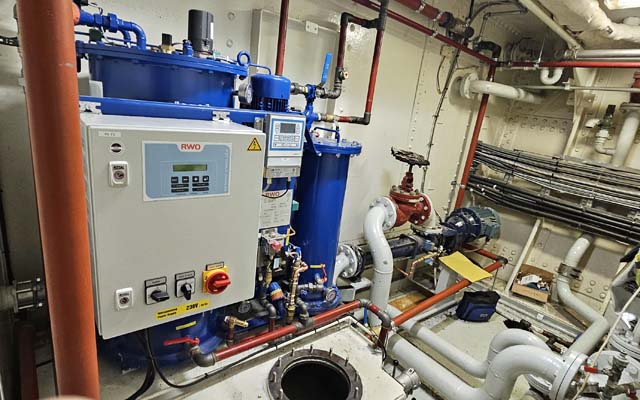An oily water separator (OWS) from RWO is helping to keep the 1914-built sailing vessel ‘Statsraad Lehmkuhl’ compliant with environmental regulations 110 years after delivery.
The compact dimensions and simple design of RWO’s OWS-COM make it suitable for Statsraad Lehmkuhl, helping the unique vessel to comply with latest environmental regulations as it voyages worldwide. Built in Bremerhaven, Germany in 1914, Statsraad Lehmkuhl is a three-masted steel barque owned and operated by the Statsraad Lehmkuhl Foundation in Bergen, Norway. While the vessel primarily serves as a sail-training ship, it is increasingly used for research purposes.
With regular training and sightseeing trips keeping it occupied between worldwide voyages, Statsraad Lehmkuhl operates in a variety of sensitive environments and emission control areas – and must therefore adhere to the strictest environmental regulations.
Hybrid battery power has been installed to help drive propellers when wind power alone is not enough, but the barque must rely on diesel generators part of the time. Accordingly, the vessel is equipped with an OWS from RWO to minimise the impact of wastewater discharge.
When the old OWS onboard Statsraad Lehmkuhl had to be replaced, the operators opted for RWO equipment after previous positive experience. The new separator was installed under the guidance of RWO’s Norwegian service partner IRRSEA during the ship’s overhaul in 2023.
Tested and approved in line with IMO Resolution MEPC. 107(49) and Clean Design class rules, RWO’s OWS-COM uses a two-stage process to treat a ship’s bilge water prior to its discharge overboard. By minimising turbulence, the system’s suction-based operation achieves more efficient separation than comparable technologies and helps to keep components in working order for longer.
RWO supplies intelligent water management solutions across commercial shipping, but the use of its technology on such an iconic vessel has not been based solely on the need for reliability and compliance alone. Built for a different era, there is little room to spare on board Statsraad Lehmkuhl, meaning that the size and configuration of the OWS were crucial considerations.
Per Sivertsen, Project Manager, Statsraad Lehmkuhl Foundation said: “As maritime regulations evolve, vessels require more and more onboard equipment to maintain compliance, but vintage vessels like Statsraad Lehmkuhl simply weren’t designed to accommodate the complex technology that is required today. Installing and maintaining new systems including OWS can therefore be challenging and time consuming.”
Beyond supply and installation, RWO’s after-sales services and training to ensure that Statsraad Lehmkuhl’s crew can continue to use the OWS-COM safely and effectively, with local support provided by IRRSEA. Part of RWO’s global network, IRRSEA and its team of engineers supported the onboard integration of the OWS and designed a solution for an additional settling tank for enhanced bilge water management.
Image: RWO’s OWS on board the ‘Statsraad Lehmkuhl’ (credit: RWO / JLA)



